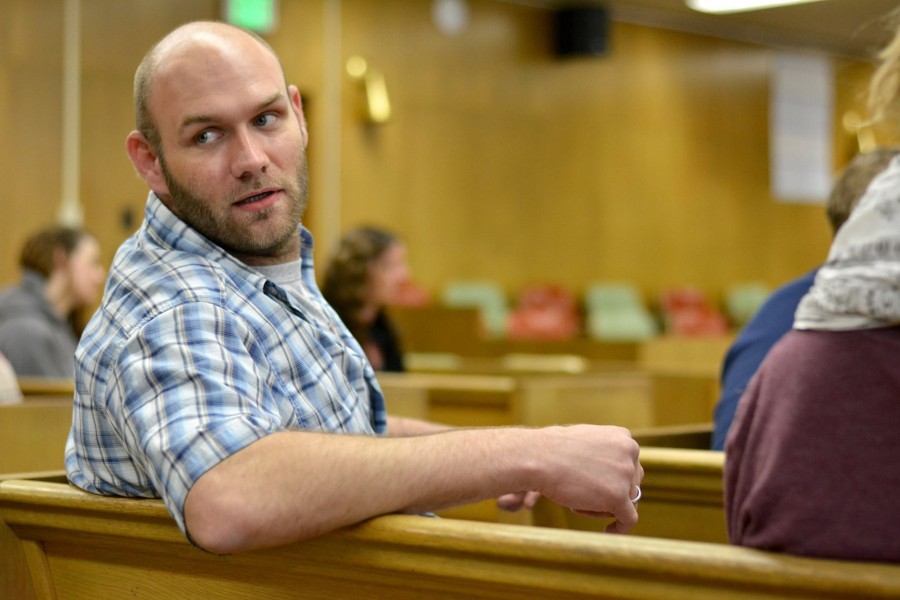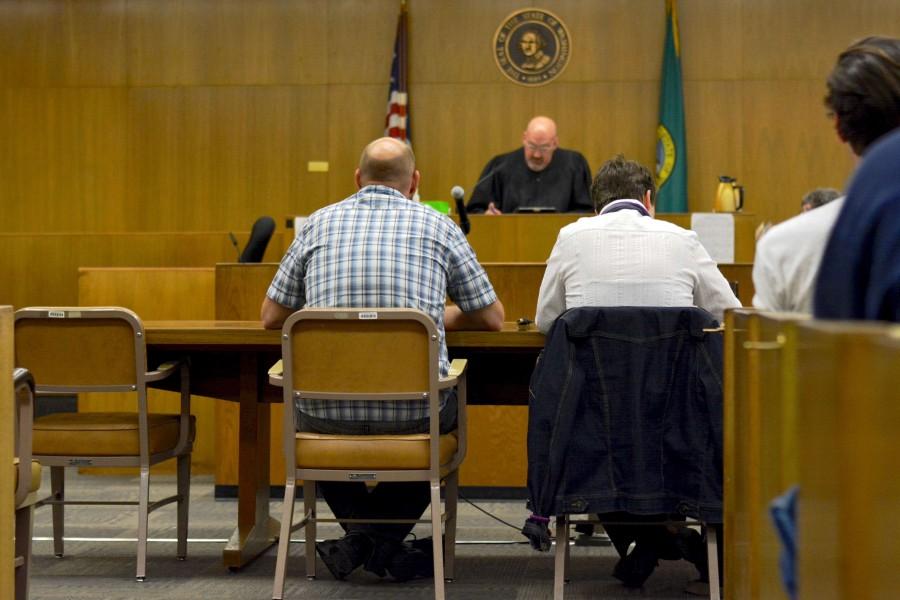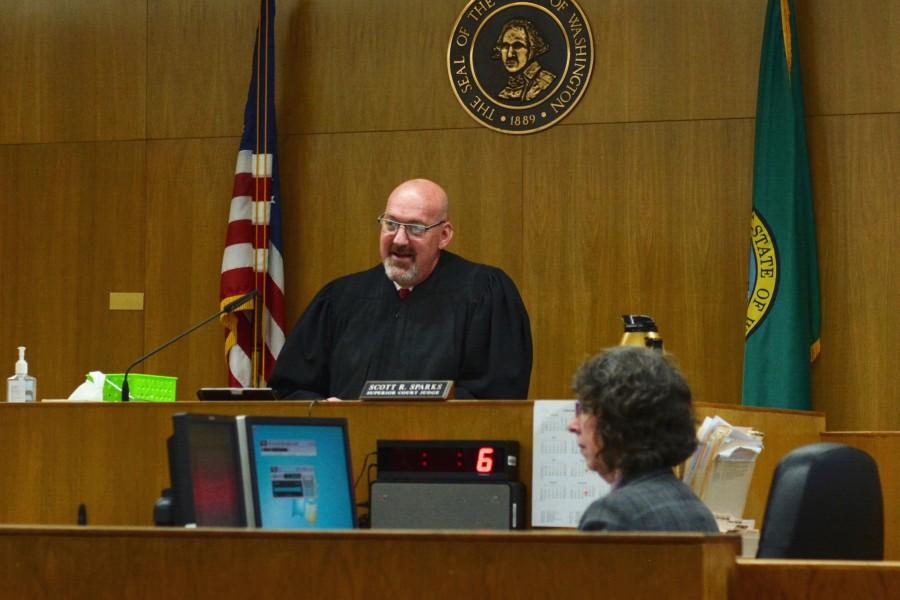Drug court provides a second chance
April 21, 2016
Tyler Fulgham was 16-years-old the first time he smoked meth. He had just gotten out of church when one of his friends handed him a pipe and told him to smoke it.
Tyler didn’t recognize the smooth, rocky chunks filing the bowl. They almost looked like rock candy. So he asked his friend what it was.
“It’s glass,” his friend replied.
Tyler smoked it. And for the next decade and a half, Tyler continued to smoke it.
“A lot of addicts will say that you’re always trying to get back to that first high,” he says.
By the time he was pushing into his 30s, Tyler’s past had finally caught up to him. A string of DUIs landed him in jail in 2013, and rather than take the hit of a felony on his record, Tyler decided it might be a good idea to finally get clean.
“I really wasn’t getting anywhere in my life,” he says. “So I thought, ‘What the hell?’”
Late last year, Tyler applied to Kittitas County Drug Court – a special court that absolves drug-related felony charges after a grueling sober treatment course. It’s not open to just anyone and it’s hard, but Tyler applied anyway.
On Dec. 22, 2015, he got in and joined about 15 other individuals working to remove a felony from their record and a lifestyle ingrained in their brains.
Like the name suggests, the special court exists to offer treatment to drug users, rather than simply handing down a jail sentence. For Tyler, that meant a second shot at life.
“I’m blessed with a chance to do this,” he says. “I’m 31 and I don’t want to spend the next four years of my life in jail.”
 McKenzie Lakey/Observer
McKenzie Lakey/Observer
An unhealthy addiction
The idea of a special court tailored around the need of drug users began in 1989 in Miami, when lawmakers had a concept for a revolutionary court system that focused on helping addicts become clean. The idea spread, and now drug courts can be found nationally.
Drug court is different from normal court. Everybody that’s accepted into the program is “free” – they don’t have to spend a minute in jail. But they do have an intense 16-month long process of getting and staying clean.
They have to go to sober support groups, pass almost-daily urinalysis screenings, finish their GED if they don’t have a diploma, and find employment before they can graduate. It’s hard, and those running it say a little less than half of the people that enter drug court fail out.
In Kittitas County, it all started with Emily Brown, Kittitas County’s drug court coordinator since 2003 (when the program started), and a therapeutic courts manager at Merit Resource Services.
“If we can get these people clean, then they’re not coming back and committing drug crimes,” Emily says.
Emily has weekly meetings with everyone enrolled in drug court. Right now, that’s 19 meetings a week. Her eyes are tired, and she talks to her patients like a stern mother. When someone misses a meeting, she doesn’t coddle them.
And maybe that’s why, since drug court in Kittitas County began, it has helped 82 people become clean and sober. Some relapsed and committed another felony – 12 people to be exact – but most stayed clean.
Candace Hooper has been drug court’s deputy prosecutor since the program started. She says Kittitas County’s system followed a national model that seemed to be working in other states and counties. At first there were a few growing pains (the first patient in drug court failed out), but they’ve since honed their craft to the best of their ability.
Not only did they find that it was cheaper to work with users for 16 months on getting clean rather than incarcerating them for months, maybe even years (Hoopers says many drug users are repeat offenders and end up back in jail as soon as they get out), but it was actually changing people’s lives.
“We see results,” Candace says. “Drug court works. It doesn’t work perfectly, but it works.”
And it couldn’t have come at a better time. Candace and other court systems in Washington State were beginning to see a trend. Illegal drug use was rising since the mid 2000s and now, she says, opiate-related drug charges are the highest she’s ever seen.
“We think about 80 percent of our crimes are committed because of drugs,” Candace says. “We don’t know if that’s true, but that’s just the sense we get.”
While concrete reasons for the increase in illegal-drug use varies depending on which public health worker you ask, a constant is the amount of legal painkillers being prescribed. People take them, get addicted, then look for the next best thing, which is often heroin or meth.
In a 1999 study by the University of Washington Alcohol & Drug Abuse Institute (UW ADBI), Washington State admitted 318 patients on prescription painkiller-related issues. In 2010, that number jumped to 4,898. For heroin-related treatment admissions, there were 4,152 in 1999 and 6,914 in 2010.
And Kittitas County is no different. In many cases, it echoes these national and state trends.
“I bet if you went into 10 houses in Ellensburg, eight of them would have prescription drugs inside,” said Judge Scott Sparks, who has been presiding over Kittitas County’s Drug Court since 2011. “It’s easy to get your hands on these.”
Judge Sparks has been a Kittitas County Superior Court judge for over a decade. And he was a defense attorney for even longer. He’s seen it all: Every drug, every user, every story attached to both.
“When I was practicing as a defense attorney, I had to wait two or three days to talk to the person if they were a drug client,” Sparks says. “I couldn’t have a meaningful conversation with them as an attorney, not until things had gotten out of their system for a few days.”
As one of two superior court judges in Kittitas County – and the primary judge in charge of the criminal docket – Sparks sees a lot of the same faces over and over. People get arrested, get out, reoffend. Rinse and repeat.
“I still think that the population of our jail, if you take away drugs and alcohol, the population would probably be one tenth of what is now,” Sparks says. “Most of the crimes in some fashion are related to the drug world. It’s tough.”
Drug court
“Good evening everyone, please be seated,” Judge Sparks says as he enters the courtroom each Tuesday at 5 p.m.. When he speaks, his lips and thick grey goatee are warped from smiling too much. He addresses each patient by name, and the only thing shinier than his teeth is his bald head.
The uncomfortable oak benches are filled with rows of heads atop bodies fighting to stay clean. Some are focused forward; others are turned to talk to friends or people who understand just what in the hell they’re actually going through.
When Judge Sparks calls a name, it means it’s time to face the hot seat. If everything’s going well, and they haven’t missed a urine analysis or sober support group, they get to move forward in the program, with the goal being to graduate after phase four.
They also get a “kudo” in the form of chocolate candy. He keeps a basket full of them at his bench.
But if everything isn’t going well, that’s a different story. Each case and person are different, and so is each punishment. It could be as severe as moving back a phase in the program, to being dropped completely (and returning to jail with a felony on their record) or as light as being told to write a letter on why they intend to stay in drug court.
“I applaud all of you guys and gals,” Sparks says one evening. “I really am impressed. I think I’ve seen almost everyone in here in jail. And it’s so nice when I see you in civilian clothing. And with smiles.”
The same, but a little different
Everybody in drug court has a different story. It might be a possession charge (a felony in every state as part of America’s “war on drugs”) or anything related with drug abuse like theft or burglary. Drug court doesn’t accept any felony charge, however. They must be a first offender, and it must be mild.
Kyle Collins, 26, was busted for allegedly stealing a calculator and for having meth, heroin and prescription painkillers. Darlene Canady, 36, was charged with second-degree theft and identity theft, in addition to possession of meth.
Matthew Menamee, 20, allegedly used a stolen EBT card to purchase $100 of groceries from Safeway. And after almost a full year of drug court and being taken away twice for inpatient treatment after failing a urinalysis, he’s into phase two (out of five) of the program.
“I try to treat everybody with respect. I don’t care if they murdered someone, they’re still a human being,” Judge Sparks says. “Their very worst moment in their life shouldn’t define who they are.”
And there’s a reason everyone takes it so seriously. According to data gathered by UW ADBI, Kittitas County didn’t register a single prescription and/or heroin death from 2002 to 2004. But between the years of 2011 to 2013, the county had an annual rate of 9.6 deaths per 100,000 people – a full point above the state average.
“The joke used to be that we only ask them to change one thing, and that’s everything,” Emily says.
One patient, Jeffrey Smith (his name has been changed to protect anonymity), 21, is a junior at Central Washington University. His treatment has been going well for months, and each week he gets a kudo. He doesn’t like chocolate, so Judge Sparks sometimes gives him golden star necklaces instead. Other times, it’s just verbal recognition.
Smith has long, blonde hair that he keeps in a bun. He devotes his life to Krishna, a Hindu deity. He keeps a pair of tiny symbols in his jacket so he can chant “Hare Rama, Hare Krishna” while he crashes them together and he has the full chant on the back of a yellow Krishna shirt he wears.
He likes to walk everywhere. But when he walks down staircases, he doesn’t; he glides down the railings on his butt.
“Once Krishna has you, there’s now way to get away from it,” Smith says.
Last October, Smith was busted with drugs folded up in a piece of tinfoil in his wallet. With every intention of graduating from Central on time rather than spending up to a year in jail, he applied to drug court, where he’s been since November.
He used to take psychedelics, especially when he would go to music festivals or while hanging out with friends, but he’s since cut that out of his life for good.
“I’m not interested in taking drugs anymore,” he says.
He’s is in phase two of the program now and has about another year left before he “graduates.” He also has about one more year left at Central, where he’s working on an anthropology degree. Smith is stern when he says he’s there’s no way he’s failing either program.
“Drug court is the grace of God,” Smith says. “Some people would disagree with that, but they’re still tangled in a material existence.”
Time to move on
How to combat illegal drug use is one of the hardest questions lawmakers and resource providers are trying to answer. After seeing the same types of people over and over, it can begin to take its toll.
“It’s hard not to get cynical,” Judge Sparks says. “But it doesn’t break my heart because they’re responsible for themselves. I can lead the horse to water, but I can’t make them drink.”
Candace has had to prosecute some people as many as 20 times. And when it’s a drug-possession charge, the court has no option other than to impose a felony charge if convicted.
But the one option a person does have if facing a felony charge is drug court. And after 82 graduates – of which, 70 did not reoffend – some could say drug court has its place in the hierarchy of the American court system.
“We really see people change their lives around,” Candace says. “It’s one of the most positive things I do in my job.”
And for Tyler Fulgham, it seems to be working. He’s doing well.
He started school full-time last quarter at Central. He still has about four more years, but when he graduates he wants to help addicts; to use the experience he had to better their lives. But for now, he’s working on his Gen Eds, which he devotes a healthy amount of stress to.
He recently moved to on-campus housing at Brooklane Village. This is better, he says, since he used to rely on his father to drive him into Ellensburg every day from Kittitas.
In addition to classes, Tyler has daily sober support meetings and has to turn in urine analyses at least three times a week. And on top of that, there’s drug court at 5 p.m., every Tuesday.
But that’s okay, because it keeps him from being bored. It keeps his mind off the drugs he spent 14 years thinking about.
“Now it’s about discovering what I am and what I stand for,” Tyler says, his bald head covered by a brand new gray Central ball cap. It’s the Friday before final’s week and he has to hurry home to do laundry and study.
“My future was the next day,” he says. “It was making sure I had enough. Now, I’m returning back to society.”


